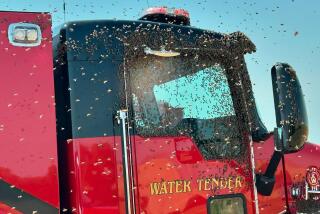Tucson Takes Invasion of Africanized Bees in Stride
TUCSON — Gordon Waller was the first person in Arizona to be ambushed by Africanized honeybees.
Even as a retired federal government bee expert and hobbyist beekeeper, Waller was fooled by the swarm of honeybees that landed on a creosote bush in front of a friend’s home.
“They weren’t anything spectacular,” he said. Innocently enough, he shook the branches so the bees would fall into his hive box, and he carried it into the back yard so his friend’s children could study them.
The family went on vacation and five weeks after capturing the swarm, Waller drove over to see how they were doing. He nonchalantly opened the top of the white box. The bees attacked him instantly.
“I’ve never experienced anything quite so intense in my life,” Waller said. “I knew instantly what they were--Africanized honeybees--and I ran for the car as fast as I could.”
Some followed him inside the vehicle. “If European bees are in a car, they go for the window to try to get out. But these kept going after me.”
He was home in minutes, ran indoors and found he had only been stung 10 times. Why not hundreds of times, as is typically feared? “The thing about these bees is that they’re predictably unpredictable,” he said.
The Africanized honeybees arrived here last summer, and Waller was their first target. He had no reason to expect them because they arrived months ahead of projections. Since then, they have stung half a dozen people, none critically, and have killed at least two dogs in the Tucson area.
And the city seems to be taking it all in stride.
There are so many Africanized bees in town that the state’s Department of Agriculture has stopped trapping them for identification. Tucson is considered “colonized” by the winged Brazilian devils.
The Tucson Citizen has all but stopped reporting bee incidents. A municipal water department employee works full time to remove Africanized bee colonies from water meter boxes. And residents in areas where bees have been confirmed now shrug them off as just another nuisance in daily life, along with snakes and scorpions.
“I’m careful but I’m not overly concerned,” said Inge Huhn, who lives across the street from where a dog was killed while being shampooed. The scent of the lather apparently set the bees off. The dog was stung 150 times; its owner was stung six times before she got safely indoors.
More to Read
Sign up for Essential California
The most important California stories and recommendations in your inbox every morning.
You may occasionally receive promotional content from the Los Angeles Times.









